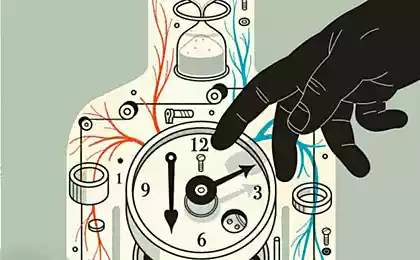715
Hours Your body: what you need to know
Light aktiviziruyutsya from 3 to 5 am. Then from 5 to 7 am is Wake-up time large intestine. If you are awake during these hours, it is best to drink a glass of water, you can also eat some dried fruit.
Then starts to work stomach from 7 to 9 o'clock in the morning, this is the best time to eat Breakfast, porridge or muesli will be a great choice. But don't limit your Breakfast, you can add nuts and fruit.
A little later, from 9 to 11 a.m. the stomach is resting, at that time, as pancreas actively work. To overload the stomach a hearty Breakfast at this time is not necessary, it is best to eat fruit or low fat yogurt.
The usual lunch time from 11 to 13 hours. At this time, actively working heart— so you should not overeat. In these hours it is better to limit yourself to one dish, best soup or salad. From 13 to 15 hours actively working the colon.
Kidney and bladder begin intensive work with 15 to 19 hours. At this time we should drink a lot! For dinner there is chicken, fish, prawns plus a side of steamed vegetables.
From 19 to 21 hours, the kidneys begin to relax, so at this time need to drink less and try not to eat. But circulation in this time of intense! This is a good time for an evening walk.
21 to 23 hours to do can be anything they like, and engage.
From 23 to 01 hours in the night begins its work gallbladder. No fatty foods! You can eat fruit. From 1 night to 3 nights running liver.
Seventy one million three hundred forty one thousand five hundred one
In a balanced diet important regular meals at the same time of day granularity meal distribution between Breakfast, lunch, dinner, brunch, afternoon tea. With 3 meals a day is a day for the first two steps amount to 2/s of the daily energy value ("energy intake") of food and dinner- '/z. Often, daily diet energy value is as follows: Breakfast — 25-30 %, lunch — 45% to 50%, dinner — 20-25 %. The time between Breakfast and lunch, lunch and dinner should be 5-6 hours between dinner and bedtime, 3-4 p.m. These periods include the height of the activity of the digestive functions, digestion and absorption the principal amount of the ingested food. More efficient 5 — 6 meals a day. At 5 meals a day for the first Breakfast should account for about 25% of calorie daily diet, lunch — 5-10 % (light snack — fruit and tea), lunch — 35 %, afternoon — 25 %, dinner — 10 %. With a 4-course meal on the first Breakfast should account for 20-25%, second Breakfast — 10-15 %, lunch-35-45%, dinner — 20-25% calorie daily diet.
The actual distribution of the daily diet has significant differences in climate conditions, working life, traditions, habits, and other factors.
Table for optimal reception products
Dairy produce
Kefir (8:00-16:00) Butter (6:00-19:00) Milk (19:00-7:00) Yogurt (10:00-16:00) Ryazhenka (7:00-19:00) sour Cream (7:00-19:00) Cheese (9:00-19:00) cottage Cheese (9:00-18:00) Pure yogurt (8:00-16:00) Condiment
Asafoetida (11:00-14:00) star Anise (5:00-17:00) Vanilla (5:00-17:00) Carnation (11:00-18:00) Mustard yellow (11:00-14:00) black Mustard (11:00-14:00) Ginger (10:00-17:00) Kaleji (11:00-18:00) Cardamom green (7:00-21:00) Coriander (11:00-16:00) Cinnamon (6:00-17:00) Cumin (10:00-16:00) Turmeric (10:00-17:00) Bay leaf (10:00-15:00) Mac Black (10:00-15:00) Mango (powder) (10:00-17:00) Nutmeg (11:00-16:00) allspice (11:00-19:00) red Pepper CP gg (11:00-14:00) Pepper paprika (11:00-14:00) black Pepper (11:00-15:00) chili (11:00-16:00) Cumin (7:00-18:00) Fennel (5:00-21:00) Shambhala(fruit) (10:00-14:00) Fruits, dried fruits, berries and honey
Apricot (7:00-16:00) Pineapple (9:00-15:00) Orange (10:00-15:00) Watermelon (11:00-17:00) Banana (7:00-20:00) Hawthorn (10:00-21:00) Grape (7:00-18:00) Cherry (8:00-16:00) Garnet (10:00-18:00) Grapefruit (11:00-15:00) A Pear (8:00-19:00) Melon (9:00-16:00) Strawberries (8:00-18:00) Raisins (6:00-21:00) Kalina (10:00-18:00) Strawberry (10:00-16:00) Gooseberry (6:00-18:00) Dried Apricots (7:00-16:00) Lemon (11:00-16:00) Raspberry (8:00-19:00) Mandarin (9:00-16:00) Honey (6:00-18:00) Sea Buckthorn (8:00-18:00) Peach (7:00-15:00) Drain (7:00-16:00) Red currants (11:00-16:00) black Currants (7:00-20:00) Date (6:00-19:00) Persimmon (7:00-19:00) of Prunes (6:00-17:00) wild Rose (8:00-18:00) Apples (7:00-19:00) Vegetable oils and herbs
Diastase (11:00-15:00) maize Oil, (11:00-15:00) olive Oil (9:00-18:00) sunflower Oil (9:00-16:00) Oil, soybean (10:00-16:00) Parsley (11:00-18:00) Salad (11:00-20:00) Dill (11:00-16:00) Nuts and seeds
Walnuts (7:00-20:00) sunflower Seeds (9:00-17:00) Nut-peanut (9:00-18:00) hazelnuts (10:00-17:00) pumpkin Seeds (11:00-16:00) Vegetables, melons and herbs
Carrots (9:00-19:00) Squash (9:00-20:00) Tavern (10:00-20:00) Cucumber (10:00-18:00) Beets (10:00-19:00) Pumpkin (10:00-19:00) Radish green (10:00-17:00) Turnip (10:00-17:00) Eggplant (11:00-16:00) bell pepper (11:00-17:00) Cabbage (11:00-18:00) cauliflower (11:00-16:00) Potatoes (11:00-15:00) Tomato (11:00-15:00) Radish (11:00-15:00) black Radish (11:00-15:00) Cereals
Buckwheat (11:00-20:00) Peas (11:00-14:00) Beans (11:00-14:00) Corn grits (11:00-14:00), Oats (11:00-14:00) pearl Barley (11:00-14:00) Wheat (11:00-14:00) Semolina (11:00-14:00) Millet (11:00-14:00) Rice (11:00-14:00) Soya (11:00-14:00) The biological clock of an organism
If you can learn to adjust to the schedule of the biological clock of your body, it is possible to regulate not only their behavior, but also the mood.
Numerous studies have proven that we all live by certain biological clock. And although different people have this watch run a little fast or lag behind, however, average values will be fair for most people on the planet. So, what our bodies what time of day the rest or Vice versa, become hyperactive?
Hour of blindness — visual acuity in humans heaviest declines in 2 hours a night, which is especially important for motorists.
The hour of birth and death most children are born between 0 and 4 hours at night. In the early morning hours (about 4) most often occur heart attacks and strokes in people with cardiovascular disease.
Hour lethargy — the low blood pressure observed between 4 and 5 am.
An hour of love — the maximum secretion of sex hormones is observed from 8 to 9 am.
Hour pain relief — from 9 to 10 o'clock in the morning the man low pain sensitivity.
An hour of creativity — hemisphere of the brain is responsible for creative and abstract images, the most actively works with 10 to 12 hours a day.
The hour of physical education — highest returns our muscles show from 12 to 13:30.
Hour digestive — most of the gastric juice is formed from 12:30 to 13:30.
Hour skill from 15 to 16 hours work best fingers, which is important for those whose activities are associated with fine motor skills and tactile sensations.
Hour growth — hair and nails grow the fastest between 16:30 and 17:30.
Hour of running — lungs breathe most intensively between 16:30 and 18 hours.
Hour senses — taste, hearing and sense of smell escalated between 17 and 19 hours.
Hour alcohol — most effective liver breaks down alcohol between 18 and 20 hours.
Hour beauty — the skin is most permeable to cosmetic products between 18 and 20 hours.
Communication — the hardest thing is loneliness is transferred between 20 and 22 hours.
Hour immunity the most effectively the immune system protects the body from various infections from 21:30 to 22:30.
Normally our daily life is painted literally on minutes. The man is a living biological creature whose own body leads your individual daily routine, not associated in any way with our plans. And we rarely think about the fact that our body also lives on a strict schedule and biological clock of a person. This watch is very accurate and unchanged.
The biological clock in the human body occur rhythmically and cage are constantly adjusted to each other, thereby synchronizing their work and therefore the pulsation is the same. This phenomenon is comparable to the swinging time of the pendulum, but these processes are quite fast, but the biological processes that occur in the human body is equal to the day. Such processes are called circadian or circadian fluctuations. In humans, many functions, not just a dream, are subject to circadian rhythm, this rise and drop in blood pressure, fluctuations in body temperature, ie, at night it is reduced by one degree, sweating palms and other changes.
The formation of biological rhythms occurs gradually. In newborns they are still unstable when the period of sleep, wakefulness, feeding alternating asymptomatic, but gradually the brain begins to submit to the alternation of day and night and with all the hormonal and other bodies, will be subject to such rhythms, such systems in the body are called endogenous clock. Such programmed cyclic changes in the body begin to suggest the time of day, year, and thereby prepare the human body for the upcoming changes, which may be accompanied by increased body temperature or the secretion of hormones that prepare the body to wakefulness, and when this begins to activate the digestive tract and other organs, in particular the hypothalamus.
The hypothalamus is the internal endocrine organ, which is located in the part of the brain, and this gland regulates the rhythm of work of all organs and is responsible for maintaining the constancy of the internal environment and it communicates with other bodies that perform all necessary functions in a given period of time. Internal biological clock is not damped even if you change their usual habitat. For example, in a specially isolated from light, sound and other external phenomena, the human body is subject to biological clock, and even in those conditions will advance the sleep and awakening rhythmically.
Such watch and remain in flight for long distances, through many time zones, and in this case the person fails these biological clock, which leads to a change of the body. However, he feels weakness and fatigue of the whole body, he wants to sleep, although the day appears dry mouth, headaches, dizziness and these effects disappear when the human biological clock is not adjusting to the right rhythm.
Consider what happens to the human body in specific hours.
One hour.
At this time the health of the body is minimal. The body is in deep sleep. There is an active secretion of the sleep hormone melatonin.
The liver actively participates in metabolism, ingested during dinner, so after midnight, the body is much worse than liquor. If you Wake up a sleeping person about 1 a.m., it will be hard to leave the bed, as blood pressure and body temperature is reduced.
A dream takes six years of human life. Without dream man can not live two weeks. From 1.30 till 3.30 active Meridian of the small intestine.
Two hours.
The drivers are driving slowly respond to optical stimuli. The number of accidents increases dramatically. Most people start a fever, in these hours the body is exceptionally sensitive to the cold. The liver metabolizes alcohol, drinking the night before.
Three hours.
People prone to depression often Wake up at this time, their mood is deteriorating, oppressed by grim thoughts. At this hour, dramatically increases the curve of suicides. Mental mood reaches its lowest point. This is a consequence of exposure to melatonin. that makes the body sluggish and relaxed. Daylight inhibits melatonin production, so during the day a person is active and is mostly in good spirits.
From 3.30 to 5.30 active Meridian of the bladder.
Four hours.
The body receives a portion of stress hormone cortisone, like during sleep it devastated my batteries, and this portion is necessary for the body to be functional after waking up.
However, this "injection" activity fraught with consequences: in the early morning hours is a high risk of a heart attack. Its difficult to tolerate and patients with asthma at this time is very constricted bronchi. The time of maximum activity of the liver. Insulin dependent diabetics should know that at this time, and at 16.00 the body best responds to insulin. Given this, it is possible more economically to spend it.
Five hours.
The body of men produces the maximum amount of the sex hormone testosterone. Maximum reaches the production of adrenal hormone cortisone. The concentration of cortisone in the body six times a day, so doctors are familiar with chronobiologia, suggest the main meds to take in the early hours, and taking into account the natural release of hormones, questioning the standard of "three times a day." From 5.30 to 7.30 the active Meridian of the kidneys.
Six hours.
The cortisone acts as an internal alarm clock. It's time to Wake up: aktiviziruyutsya overall metabolism, increases the level of sugar and amino acids in the blood, all other substances necessary for building new tissue cells that is the energy required for the body throughout the day. At this time, particularly effective drugs that reduce blood pressure, and beta-blockers. But the food and the nicotine poisons the body takes is much worse than at other times of the day. The early hours adverse for smokers: cigarette on an empty stomach ultimately constricts blood vessels, much bigger than a cigarette smoked in the evening. Morning drink increases the alcohol level in the blood is doubled compared with the result of the evening's festivities.
Seven hours.
After waking up and morning exercise should Breakfast. Folk wisdom — "eat Breakfast yourself, lunch share with a friend, a dinner give the enemy" — is absolutely true.
The reason is that the internal clock of the digestive system before lunch they convert carbohydrates into energy, and in the evening into fats. Aktiviziruyutsya activity of the colon. It was at this time there must occur a bowel movement and it will result in increased efficiency and stamina of the body. From 7.30 to 9.30 active Meridian of the pericardium.
Eight hours.
Glands produce a number of hormones. Preparation of body for labour day. Dramatically exacerbated the sensation of pain is intensified attacks in chronic patients, for example, rheumatism.
Nine hours.
Biological clock show the arrows on the stomach. If you are prescribed injections, it is better to do them in the morning — this will save you from the increase in temperature and swelling. Vaccinations at this time, cause fewer complications than vaccinations, in the course of the day. Held at this time radiation therapy is also tolerated by cancer patients much easier. At this time, the people most resistant to x-ray radiation. 9.30-11.30 active triple heater Meridian.
Ten hours.
Body temperature and performance reach its peak.
Especially a well-functioning short-term memory, whereas long-term memory optimal the afternoon. The text read about nine in the morning, remembered faster than read in 15 hours, but it is also quickly erased from memory — somewhere in a week, which is not true about the text, read in the afternoon. Lesson learned 10am, must be repeated after lunch. And Chinese scientists indicate that at this time our right limbs are charged a large amount of energy. Perhaps that is why the morning handshake so vigorous. Counting abilities attained in this period its peak and will gradually decline.
Eleven hours.
Before lunch appears exceptional performance, especially in computing. Students mathematics is much easier between 9 and 12 a.m. then, between 16.30 and 18 hours. The heart also is in such great shape that if at this time to conduct his research, some heart disease may go undetected. At the same time it becomes much more sensitive and stressful situations beats more often than in the evening. Nevertheless, it is the right time for gymnastics. From 11.30 to 13.30 active Meridian of the gallbladder.
Twelve hours.
Increases acid production in the stomach. Hunger hard to put down. Brain activity is reduced, as the body directs blood to the digestive organs. After the morning activity there is a need to rest. According to statistics, those who can afford an afternoon slumber, a heart attack can sometimes be 30% less than those who continue to work. The need for short NAPs due to reduced blood supply to the brain. At this time most of the blood is necessary to the stomach for digestion.
Thirteen hours.
Aktiviziruyutsya activity of the gallbladder. In this period particularly well are cholagogue, colic in the gallbladder are extremely rare. Performance compared to the average per day is reduced by 20%. 13.30 to 15.30 active liver Meridian.
Fourteen hours.
Concentrated energy in the small intestine. Blood pressure and hormonal levels drop. At this time, most noticeable fatigue, but to overcome it takes a couple of minutes of relaxation. Better a NAP than to encourage your body tea or coffee. The best time to run students ' homework. Long-term memory works well, so it is advisable to repeat everything learned in the morning. For painful medical procedures local anesthesia is valid for longer and is easier it is in this hour. At 14 o'clock our teeth and skin almost insensitive to pain, but anesthetic drugs are three times better than in the morning.
Fifteen hours.
Starts the second peak of health. A healthy desire to work, regardless there was a pause for rest or not. From 15.30 to 17.30 active lung Meridian.
Sixteen hours.
Blood pressure increases and increases. Athletes at this time show the best results. The profound impact of training, whereas in the morning they are less effective. Not by chance the final athletics competitions are held at this time to achieve the best results. Very effective drugs that affect the acidity.
Seventeen hours.
A significant inflow of vital forces. Actively working kidneys and bladder. Between 16 and 18 hours faster than at any other time, grow hair and nails. From 17.30 to 19.30 active Meridian of the large intestine.
Eighteen hours.
Active pancreas. The liver is more tolerant to alcohol. Work intensively in the respiratory system.
Nineteen hours.
The pulse becomes much slower, at this time, dangerous to accept funds, panigaglia blood pressure. Effective medicines recommended in disorders of the Central nervous system and ulcerative diseases of the digestive system. Kidney function reaches its peak. From 19.30 to 21.30 active stomach Meridian.
Twenty hours.
The fat content in the liver decreases, pulse quickens. Even small doses of antibiotics affect the body at this time with great performance, but only until 4 am! The best time to 20.32, side effects in these circumstances are very rare. Also effective are antidepressants, anti-Allergy and asthma.
Twenty-one hours.
The body prepares for night's rest. Harmful to fill the stomach with food — it will remain almost not digested until the morning, and that part of that will be recycled will be converted to body fat. From 21.30 to 23.30 active Meridian of the spleen — pancreas.
Twenty-two hours.
The efficiency drops sharply. In the blood increases the number of leukocytes more than 12,000 white blood cells per millimeter, whereas in the morning there are about 5000 millimeter. You should not use medicines with side effects, danger of intoxication, the night the body is most difficult to decompose the poisons and to fight the poisoning.
Twenty-three hours.
Metabolism is minimized, and with it reduced blood pressure, pulse rate and body temperature, reduced ability to concentrate and performance. The production of cortisone is stopped. The activity of the body goes to the parasympathetic part of the autonomic nervous system. From 23.30 to 1.30 active Meridian of the heart.
Twenty-four hours.
There is an intense recovery of skin cell division in the night much more intense than during the day. In terms of active activities of parasympathetic nervous system more likely to have liver and biliary colic. As a result of lower blood pressure and heart rate on the background of violations of local blood circulation can cause strokes. In women particularly intense are the hormones that regulate contractions. For this reason, night is born twice more children than the day... posted
P. S. And remember, only by changing their consumption — together we change the world! ©
Join us in Facebook and in Vkontakte, and we're Classmates
Source: irgo.org.ua/zdorove/chasy-raboty-nashego-organizma
Then starts to work stomach from 7 to 9 o'clock in the morning, this is the best time to eat Breakfast, porridge or muesli will be a great choice. But don't limit your Breakfast, you can add nuts and fruit.
A little later, from 9 to 11 a.m. the stomach is resting, at that time, as pancreas actively work. To overload the stomach a hearty Breakfast at this time is not necessary, it is best to eat fruit or low fat yogurt.
The usual lunch time from 11 to 13 hours. At this time, actively working heart— so you should not overeat. In these hours it is better to limit yourself to one dish, best soup or salad. From 13 to 15 hours actively working the colon.
Kidney and bladder begin intensive work with 15 to 19 hours. At this time we should drink a lot! For dinner there is chicken, fish, prawns plus a side of steamed vegetables.
From 19 to 21 hours, the kidneys begin to relax, so at this time need to drink less and try not to eat. But circulation in this time of intense! This is a good time for an evening walk.
21 to 23 hours to do can be anything they like, and engage.
From 23 to 01 hours in the night begins its work gallbladder. No fatty foods! You can eat fruit. From 1 night to 3 nights running liver.
Seventy one million three hundred forty one thousand five hundred one
In a balanced diet important regular meals at the same time of day granularity meal distribution between Breakfast, lunch, dinner, brunch, afternoon tea. With 3 meals a day is a day for the first two steps amount to 2/s of the daily energy value ("energy intake") of food and dinner- '/z. Often, daily diet energy value is as follows: Breakfast — 25-30 %, lunch — 45% to 50%, dinner — 20-25 %. The time between Breakfast and lunch, lunch and dinner should be 5-6 hours between dinner and bedtime, 3-4 p.m. These periods include the height of the activity of the digestive functions, digestion and absorption the principal amount of the ingested food. More efficient 5 — 6 meals a day. At 5 meals a day for the first Breakfast should account for about 25% of calorie daily diet, lunch — 5-10 % (light snack — fruit and tea), lunch — 35 %, afternoon — 25 %, dinner — 10 %. With a 4-course meal on the first Breakfast should account for 20-25%, second Breakfast — 10-15 %, lunch-35-45%, dinner — 20-25% calorie daily diet.
The actual distribution of the daily diet has significant differences in climate conditions, working life, traditions, habits, and other factors.
Table for optimal reception products
Dairy produce
Kefir (8:00-16:00) Butter (6:00-19:00) Milk (19:00-7:00) Yogurt (10:00-16:00) Ryazhenka (7:00-19:00) sour Cream (7:00-19:00) Cheese (9:00-19:00) cottage Cheese (9:00-18:00) Pure yogurt (8:00-16:00) Condiment
Asafoetida (11:00-14:00) star Anise (5:00-17:00) Vanilla (5:00-17:00) Carnation (11:00-18:00) Mustard yellow (11:00-14:00) black Mustard (11:00-14:00) Ginger (10:00-17:00) Kaleji (11:00-18:00) Cardamom green (7:00-21:00) Coriander (11:00-16:00) Cinnamon (6:00-17:00) Cumin (10:00-16:00) Turmeric (10:00-17:00) Bay leaf (10:00-15:00) Mac Black (10:00-15:00) Mango (powder) (10:00-17:00) Nutmeg (11:00-16:00) allspice (11:00-19:00) red Pepper CP gg (11:00-14:00) Pepper paprika (11:00-14:00) black Pepper (11:00-15:00) chili (11:00-16:00) Cumin (7:00-18:00) Fennel (5:00-21:00) Shambhala(fruit) (10:00-14:00) Fruits, dried fruits, berries and honey
Apricot (7:00-16:00) Pineapple (9:00-15:00) Orange (10:00-15:00) Watermelon (11:00-17:00) Banana (7:00-20:00) Hawthorn (10:00-21:00) Grape (7:00-18:00) Cherry (8:00-16:00) Garnet (10:00-18:00) Grapefruit (11:00-15:00) A Pear (8:00-19:00) Melon (9:00-16:00) Strawberries (8:00-18:00) Raisins (6:00-21:00) Kalina (10:00-18:00) Strawberry (10:00-16:00) Gooseberry (6:00-18:00) Dried Apricots (7:00-16:00) Lemon (11:00-16:00) Raspberry (8:00-19:00) Mandarin (9:00-16:00) Honey (6:00-18:00) Sea Buckthorn (8:00-18:00) Peach (7:00-15:00) Drain (7:00-16:00) Red currants (11:00-16:00) black Currants (7:00-20:00) Date (6:00-19:00) Persimmon (7:00-19:00) of Prunes (6:00-17:00) wild Rose (8:00-18:00) Apples (7:00-19:00) Vegetable oils and herbs
Diastase (11:00-15:00) maize Oil, (11:00-15:00) olive Oil (9:00-18:00) sunflower Oil (9:00-16:00) Oil, soybean (10:00-16:00) Parsley (11:00-18:00) Salad (11:00-20:00) Dill (11:00-16:00) Nuts and seeds
Walnuts (7:00-20:00) sunflower Seeds (9:00-17:00) Nut-peanut (9:00-18:00) hazelnuts (10:00-17:00) pumpkin Seeds (11:00-16:00) Vegetables, melons and herbs
Carrots (9:00-19:00) Squash (9:00-20:00) Tavern (10:00-20:00) Cucumber (10:00-18:00) Beets (10:00-19:00) Pumpkin (10:00-19:00) Radish green (10:00-17:00) Turnip (10:00-17:00) Eggplant (11:00-16:00) bell pepper (11:00-17:00) Cabbage (11:00-18:00) cauliflower (11:00-16:00) Potatoes (11:00-15:00) Tomato (11:00-15:00) Radish (11:00-15:00) black Radish (11:00-15:00) Cereals
Buckwheat (11:00-20:00) Peas (11:00-14:00) Beans (11:00-14:00) Corn grits (11:00-14:00), Oats (11:00-14:00) pearl Barley (11:00-14:00) Wheat (11:00-14:00) Semolina (11:00-14:00) Millet (11:00-14:00) Rice (11:00-14:00) Soya (11:00-14:00) The biological clock of an organism
If you can learn to adjust to the schedule of the biological clock of your body, it is possible to regulate not only their behavior, but also the mood.
Numerous studies have proven that we all live by certain biological clock. And although different people have this watch run a little fast or lag behind, however, average values will be fair for most people on the planet. So, what our bodies what time of day the rest or Vice versa, become hyperactive?
Hour of blindness — visual acuity in humans heaviest declines in 2 hours a night, which is especially important for motorists.
The hour of birth and death most children are born between 0 and 4 hours at night. In the early morning hours (about 4) most often occur heart attacks and strokes in people with cardiovascular disease.
Hour lethargy — the low blood pressure observed between 4 and 5 am.
An hour of love — the maximum secretion of sex hormones is observed from 8 to 9 am.
Hour pain relief — from 9 to 10 o'clock in the morning the man low pain sensitivity.
An hour of creativity — hemisphere of the brain is responsible for creative and abstract images, the most actively works with 10 to 12 hours a day.
The hour of physical education — highest returns our muscles show from 12 to 13:30.
Hour digestive — most of the gastric juice is formed from 12:30 to 13:30.
Hour skill from 15 to 16 hours work best fingers, which is important for those whose activities are associated with fine motor skills and tactile sensations.
Hour growth — hair and nails grow the fastest between 16:30 and 17:30.
Hour of running — lungs breathe most intensively between 16:30 and 18 hours.
Hour senses — taste, hearing and sense of smell escalated between 17 and 19 hours.
Hour alcohol — most effective liver breaks down alcohol between 18 and 20 hours.
Hour beauty — the skin is most permeable to cosmetic products between 18 and 20 hours.
Communication — the hardest thing is loneliness is transferred between 20 and 22 hours.
Hour immunity the most effectively the immune system protects the body from various infections from 21:30 to 22:30.
Normally our daily life is painted literally on minutes. The man is a living biological creature whose own body leads your individual daily routine, not associated in any way with our plans. And we rarely think about the fact that our body also lives on a strict schedule and biological clock of a person. This watch is very accurate and unchanged.
The biological clock in the human body occur rhythmically and cage are constantly adjusted to each other, thereby synchronizing their work and therefore the pulsation is the same. This phenomenon is comparable to the swinging time of the pendulum, but these processes are quite fast, but the biological processes that occur in the human body is equal to the day. Such processes are called circadian or circadian fluctuations. In humans, many functions, not just a dream, are subject to circadian rhythm, this rise and drop in blood pressure, fluctuations in body temperature, ie, at night it is reduced by one degree, sweating palms and other changes.
The formation of biological rhythms occurs gradually. In newborns they are still unstable when the period of sleep, wakefulness, feeding alternating asymptomatic, but gradually the brain begins to submit to the alternation of day and night and with all the hormonal and other bodies, will be subject to such rhythms, such systems in the body are called endogenous clock. Such programmed cyclic changes in the body begin to suggest the time of day, year, and thereby prepare the human body for the upcoming changes, which may be accompanied by increased body temperature or the secretion of hormones that prepare the body to wakefulness, and when this begins to activate the digestive tract and other organs, in particular the hypothalamus.
The hypothalamus is the internal endocrine organ, which is located in the part of the brain, and this gland regulates the rhythm of work of all organs and is responsible for maintaining the constancy of the internal environment and it communicates with other bodies that perform all necessary functions in a given period of time. Internal biological clock is not damped even if you change their usual habitat. For example, in a specially isolated from light, sound and other external phenomena, the human body is subject to biological clock, and even in those conditions will advance the sleep and awakening rhythmically.
Such watch and remain in flight for long distances, through many time zones, and in this case the person fails these biological clock, which leads to a change of the body. However, he feels weakness and fatigue of the whole body, he wants to sleep, although the day appears dry mouth, headaches, dizziness and these effects disappear when the human biological clock is not adjusting to the right rhythm.
Consider what happens to the human body in specific hours.
One hour.
At this time the health of the body is minimal. The body is in deep sleep. There is an active secretion of the sleep hormone melatonin.
The liver actively participates in metabolism, ingested during dinner, so after midnight, the body is much worse than liquor. If you Wake up a sleeping person about 1 a.m., it will be hard to leave the bed, as blood pressure and body temperature is reduced.
A dream takes six years of human life. Without dream man can not live two weeks. From 1.30 till 3.30 active Meridian of the small intestine.
Two hours.
The drivers are driving slowly respond to optical stimuli. The number of accidents increases dramatically. Most people start a fever, in these hours the body is exceptionally sensitive to the cold. The liver metabolizes alcohol, drinking the night before.
Three hours.
People prone to depression often Wake up at this time, their mood is deteriorating, oppressed by grim thoughts. At this hour, dramatically increases the curve of suicides. Mental mood reaches its lowest point. This is a consequence of exposure to melatonin. that makes the body sluggish and relaxed. Daylight inhibits melatonin production, so during the day a person is active and is mostly in good spirits.
From 3.30 to 5.30 active Meridian of the bladder.
Four hours.
The body receives a portion of stress hormone cortisone, like during sleep it devastated my batteries, and this portion is necessary for the body to be functional after waking up.
However, this "injection" activity fraught with consequences: in the early morning hours is a high risk of a heart attack. Its difficult to tolerate and patients with asthma at this time is very constricted bronchi. The time of maximum activity of the liver. Insulin dependent diabetics should know that at this time, and at 16.00 the body best responds to insulin. Given this, it is possible more economically to spend it.
Five hours.
The body of men produces the maximum amount of the sex hormone testosterone. Maximum reaches the production of adrenal hormone cortisone. The concentration of cortisone in the body six times a day, so doctors are familiar with chronobiologia, suggest the main meds to take in the early hours, and taking into account the natural release of hormones, questioning the standard of "three times a day." From 5.30 to 7.30 the active Meridian of the kidneys.
Six hours.
The cortisone acts as an internal alarm clock. It's time to Wake up: aktiviziruyutsya overall metabolism, increases the level of sugar and amino acids in the blood, all other substances necessary for building new tissue cells that is the energy required for the body throughout the day. At this time, particularly effective drugs that reduce blood pressure, and beta-blockers. But the food and the nicotine poisons the body takes is much worse than at other times of the day. The early hours adverse for smokers: cigarette on an empty stomach ultimately constricts blood vessels, much bigger than a cigarette smoked in the evening. Morning drink increases the alcohol level in the blood is doubled compared with the result of the evening's festivities.
Seven hours.
After waking up and morning exercise should Breakfast. Folk wisdom — "eat Breakfast yourself, lunch share with a friend, a dinner give the enemy" — is absolutely true.
The reason is that the internal clock of the digestive system before lunch they convert carbohydrates into energy, and in the evening into fats. Aktiviziruyutsya activity of the colon. It was at this time there must occur a bowel movement and it will result in increased efficiency and stamina of the body. From 7.30 to 9.30 active Meridian of the pericardium.
Eight hours.
Glands produce a number of hormones. Preparation of body for labour day. Dramatically exacerbated the sensation of pain is intensified attacks in chronic patients, for example, rheumatism.
Nine hours.
Biological clock show the arrows on the stomach. If you are prescribed injections, it is better to do them in the morning — this will save you from the increase in temperature and swelling. Vaccinations at this time, cause fewer complications than vaccinations, in the course of the day. Held at this time radiation therapy is also tolerated by cancer patients much easier. At this time, the people most resistant to x-ray radiation. 9.30-11.30 active triple heater Meridian.
Ten hours.
Body temperature and performance reach its peak.
Especially a well-functioning short-term memory, whereas long-term memory optimal the afternoon. The text read about nine in the morning, remembered faster than read in 15 hours, but it is also quickly erased from memory — somewhere in a week, which is not true about the text, read in the afternoon. Lesson learned 10am, must be repeated after lunch. And Chinese scientists indicate that at this time our right limbs are charged a large amount of energy. Perhaps that is why the morning handshake so vigorous. Counting abilities attained in this period its peak and will gradually decline.
Eleven hours.
Before lunch appears exceptional performance, especially in computing. Students mathematics is much easier between 9 and 12 a.m. then, between 16.30 and 18 hours. The heart also is in such great shape that if at this time to conduct his research, some heart disease may go undetected. At the same time it becomes much more sensitive and stressful situations beats more often than in the evening. Nevertheless, it is the right time for gymnastics. From 11.30 to 13.30 active Meridian of the gallbladder.
Twelve hours.
Increases acid production in the stomach. Hunger hard to put down. Brain activity is reduced, as the body directs blood to the digestive organs. After the morning activity there is a need to rest. According to statistics, those who can afford an afternoon slumber, a heart attack can sometimes be 30% less than those who continue to work. The need for short NAPs due to reduced blood supply to the brain. At this time most of the blood is necessary to the stomach for digestion.
Thirteen hours.
Aktiviziruyutsya activity of the gallbladder. In this period particularly well are cholagogue, colic in the gallbladder are extremely rare. Performance compared to the average per day is reduced by 20%. 13.30 to 15.30 active liver Meridian.
Fourteen hours.
Concentrated energy in the small intestine. Blood pressure and hormonal levels drop. At this time, most noticeable fatigue, but to overcome it takes a couple of minutes of relaxation. Better a NAP than to encourage your body tea or coffee. The best time to run students ' homework. Long-term memory works well, so it is advisable to repeat everything learned in the morning. For painful medical procedures local anesthesia is valid for longer and is easier it is in this hour. At 14 o'clock our teeth and skin almost insensitive to pain, but anesthetic drugs are three times better than in the morning.
Fifteen hours.
Starts the second peak of health. A healthy desire to work, regardless there was a pause for rest or not. From 15.30 to 17.30 active lung Meridian.
Sixteen hours.
Blood pressure increases and increases. Athletes at this time show the best results. The profound impact of training, whereas in the morning they are less effective. Not by chance the final athletics competitions are held at this time to achieve the best results. Very effective drugs that affect the acidity.
Seventeen hours.
A significant inflow of vital forces. Actively working kidneys and bladder. Between 16 and 18 hours faster than at any other time, grow hair and nails. From 17.30 to 19.30 active Meridian of the large intestine.
Eighteen hours.
Active pancreas. The liver is more tolerant to alcohol. Work intensively in the respiratory system.
Nineteen hours.
The pulse becomes much slower, at this time, dangerous to accept funds, panigaglia blood pressure. Effective medicines recommended in disorders of the Central nervous system and ulcerative diseases of the digestive system. Kidney function reaches its peak. From 19.30 to 21.30 active stomach Meridian.
Twenty hours.
The fat content in the liver decreases, pulse quickens. Even small doses of antibiotics affect the body at this time with great performance, but only until 4 am! The best time to 20.32, side effects in these circumstances are very rare. Also effective are antidepressants, anti-Allergy and asthma.
Twenty-one hours.
The body prepares for night's rest. Harmful to fill the stomach with food — it will remain almost not digested until the morning, and that part of that will be recycled will be converted to body fat. From 21.30 to 23.30 active Meridian of the spleen — pancreas.
Twenty-two hours.
The efficiency drops sharply. In the blood increases the number of leukocytes more than 12,000 white blood cells per millimeter, whereas in the morning there are about 5000 millimeter. You should not use medicines with side effects, danger of intoxication, the night the body is most difficult to decompose the poisons and to fight the poisoning.
Twenty-three hours.
Metabolism is minimized, and with it reduced blood pressure, pulse rate and body temperature, reduced ability to concentrate and performance. The production of cortisone is stopped. The activity of the body goes to the parasympathetic part of the autonomic nervous system. From 23.30 to 1.30 active Meridian of the heart.
Twenty-four hours.
There is an intense recovery of skin cell division in the night much more intense than during the day. In terms of active activities of parasympathetic nervous system more likely to have liver and biliary colic. As a result of lower blood pressure and heart rate on the background of violations of local blood circulation can cause strokes. In women particularly intense are the hormones that regulate contractions. For this reason, night is born twice more children than the day... posted
P. S. And remember, only by changing their consumption — together we change the world! ©
Join us in Facebook and in Vkontakte, and we're Classmates
Source: irgo.org.ua/zdorove/chasy-raboty-nashego-organizma
Excessive cleanliness causes the development of allergies in children
Men’s and Women’s Freedom – A Conversation























